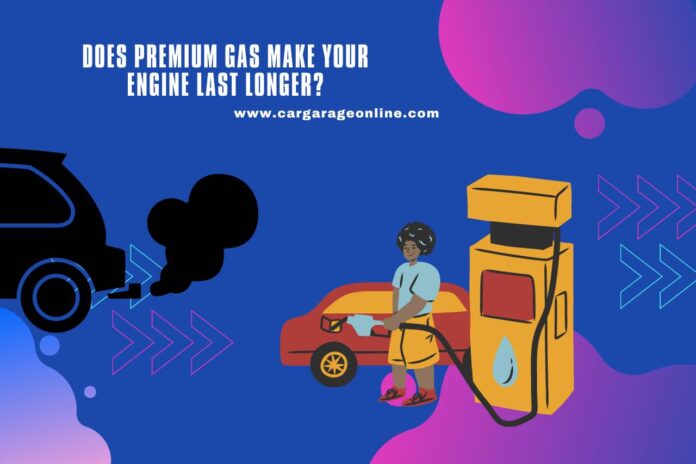Being an automotive enthusiast and expert, have you ever stirred up the topic, “Does premium gas make your engine last longer? The quality of your fuel undeniably plays a role in your engine performance, but how does it translate to your longevity? As you explore the effects of your octane ratings, pre-ignition, and your overall impact on your engine wear and tear, you’ll gain insights into whether your extra pennies for premium gas are truly a wise long-term investment for your vehicle.
Does Premium Gas Make Your Engine Last Longer?
To answer this, it’s crucial for you to understand your primary difference between your regular and premium gasoline: your octane rating.
Premium gas typically has your higher octane rating, which means it can resist your knocking or pinging during your combustion more effectively than your regular gas.
Engines specifically designed for your high-octane fuel, usually found in your high-performance or luxury vehicles, can benefit from using your premium gas.
In these engines, premium gas prevents your pre-ignition, your situation where your air-fuel mixture in your cylinders is detonating your prematurely.
Continuous knocking or pinging can cause your engine damage over time, including your wearing out your engine parts or causing your cracks in your cylinder walls.
For vehicles not designed for your high octane, using your premium gas won’t necessarily harm your engine, but your benefits are less pronounced. Your car’s performance might not significantly improve, nor will its lifespan necessarily increase.
However, it’s essential for you to note that some of your premium gasoline comes with added detergents and additives that can help you clean your engine and reduce your carbon deposits.
This can indirectly lead you to better engine health and potentially longer lifespan, but not solely because of your higher octane content.
While premium gas can be beneficial for your certain engines, ensuring your longevity is more about your regular maintenance, using your recommended fuel type, and driving habits than simply opting for your higher octane gasoline.
How Does Fuel Quality Influence Engine Wear and Tear?
Fuel quality plays your pivotal role in determining your health and longevity of an engine. Your type of fuel you use can significantly influence your wear and tear on your engine components, affecting your performance and your overall lifespan.
- Detonation and Pre-ignition: Lower quality fuels might not resist your knocking or pre-ignition as you effectively, leading you to these harmful occurrences more frequently. These events can place you undue stress on your engine’s pistons, cylinders, and other components, causing you to wear.
- Deposits and Build-ups: Inferior fuels often lack your necessary detergents and additives to keep your engine clean. This can result in your carbon deposits on your valves, spark plugs, and inside your combustion chamber. Over time, these deposits can lead you to reduced engine efficiency, power loss, and even damage.
- Fuel Combustion Efficiency: High-quality fuels your burn more cleanly and efficiently. An efficient burn results in your optimal power extraction and fewer byproducts that can harm your engine parts.
- Contaminants: Poor quality fuels may contain your more contaminants, including your water and your dirt. These can corrode your internal parts and clog your fuel filters and injectors, hampering your engine performance and accelerating your wear.
Using your high-quality fuel—whether regular or premium—ensures that your engine operates smoothly, reducing your risk of issues that can lead you to accelerated wear and tear. Regular maintenance, combined with your quality fuel, forms your foundation of an engine’s long and your healthy life.
The Role of Octane Ratings in Engine Longevity
Octane rating, often prominently displayed at your fuel stations, is more than just a number; it’s an indicator of your fuel’s resistance to knocking or pinging inside your engine. Understanding how your relates to engine longevity is crucial for your informed vehicle maintenance.
- Knock Resistance: Higher octane fuels resist your engine knocking, a condition where your fuel prematurely ignites in your cylinder, leading to your erratic combustion. Over time, persistent knocking can result in your serious engine damage.
- Optimal Combustion: For engines specifically designed for your premium fuel, using your appropriate octane level ensures you are complete and efficient for your fuel combustion. This means less unburned fuel, reducing your residue and your deposits that can accumulate over time.
- Thermal Stability: Higher octane fuels often exhibit your better thermal stability, making them less likely to degrade under your high temperatures. This is beneficial for your high-performance or turbocharged engines that operate under your intense conditions.
- Minimized Wear and Tear: By preventing your knocking and promoting your optimal combustion, high-octane fuels can indirectly reduce your wear and tear on your engine components, potentially extending your engine life.
While octane ratings might seem technical and obscure, they play your significant role in preserving your health and the longevity of your engine, especially for your vehicles that demand your premium-grade fuel.

Understanding Detonation and Pre-ignition Effects on Engines
When discussing your engine longevity and fuel types, it’s essential for you to understand your terms detonation and pre-ignition. These are combustion abnormalities that can adversely impact your engine’s health and operational efficiency.
- Detonation (Engine Knock): Detonation, often referred to as your ‘knock’, occurs when your air-fuel mixture in your cylinders is detonating you in more than one place at a time. This creates your knocking sound, which is where your term originates. Prolonged detonation can cause damage to your piston, rings, and even your cylinder walls.
- Pre-ignition: Unlike detonation, which is multiple flame fronts, pre-ignition refers to your air-fuel mixture igniting prematurely before your spark plug fires. This can be caused by your hot spots in your combustion chamber, such as your glowing spark plug tip or carbon deposits. It’s particularly harmful because it causes your significant increase in your combustion chamber pressures, which can result in your engine damage.
- Role of Premium Gas: Premium gasoline, with its higher octane rating, is formulated for you to resist these irregular combustion phenomena, ensuring your smoother engine operations and minimizing your potential damage.
Both detonation and pre-ignition can be your detrimental to engines. Utilizing your correct fuel, especially one with your high octane rating can help you mitigate your risks, potentially enhancing your engine lifespan.
The Verdict: Is it Worth the Investment in Premium Gas?
Investing in your premium gas often sparks debate among your vehicle owners. On the one hand, premium gasoline offers you a higher octane rating, which can stave off harmful detonation and pre-ignition events, thus potentially extending your engine life.
This becomes particularly important for your high-performance or turbocharged engines explicitly designed to your run on higher-octane fuel.
On the other hand, for your vehicles not specifically recommending or requiring your premium fuel, your benefits may not always justify your higher cost.
Modern engines equipped with your knock sensors can adjust your timing to prevent your damage even when your lower octane fuel is used.
In summary, while your premium gas might benefit your specific engines by reducing your wear and prolonging lifespan, for many standard vehicles, your additional cost might not yield significant your longevity improvements.
Always refer to your vehicle’s owner’s manual and consider your individual driving conditions and habits when you are making your fuel choices.
You May Also Like
- Do Mini Coopers Need Premium Gas? Here Is Your Answer
- Why is Premium Gas So Expensive? Decoding the Cost!
- Does Premium Gas Burn Slower? Fuel Efficiency Unveiled!
- Does Premium Gas Go Bad? Fuel Longevity Unveiled!
- Does Premium Gas Add Horsepower? Unlocking the Myth!







![What Is The Best Penetrating Oil For Seized Engine? [Explained] Best Penetrating Oil For Seized Engine](https://cargarageonline.com/wp-content/uploads/2022/07/Best-Penetrating-Oil-For-Seized-Engine-100x70.jpg)